|
Euroasian Jewish News

Michael Chlenov
|
EAJC Secretary General Working Visit to St. Petersburg
11.11.2013 The Euro-Asian Jewish Congress Secretary General has taken participation in the “Limmud - St. Petersburg - 2013” conference as part of his working visit to St. Petersburg. The EAJC Secretary General gave a lecture titled “Who are the Jews of Eurasia?”
The EAJC is beginning a new project in the “Northern Capital” of Russia: to work through and publish the heritage of the Soviet Jewish Ethnographer Isai Pulner (1900-1942). The scholar, who perished during the Siege of Leningrad, headed the Jewish sector of the Ethnography Museum (REM), whose archive preserved the materials he collected.
The first step of the project will be to study the rather large collection of materials dedicated to Georgian Jews. These materials were collected by Pulner during his 1926 expedition to Kutaisi. As Michael Chlenov notes, “The study and publication of these notes are very important for the history of Georgian Jews, as there are, unfortunately, very few seriously collected materials on that history. Thus the EAJC plans to make its contribution to the study of one of the most interesting ethno-cultural Jewish groups of our region. It is also important that we are restoring the memory of a remarkable and enthusiastic Jewisch scholar.”
The EAJC Secretary General held a working meeting with the Director of the Russian Ethnography Museum Vladimir Grusman and looked through the Pulner archives. Aside from the notes on Georgia Jewry, the archive contains Pulner’s unfinished thesis on Jewish marriage, based on his field studies in the Jewish towns of Belarus, and notes on 1930s Birobijan.
Michael Chlenov also participated in the opening of the REM exhibition “Between Two Worlds,” timed to the 150th anniversary of the important Jewish ethnographer Semen An-sky (sic!), and in a panel at this conference.
Michael Chlenov also negotiated the publication of a future collection of articles with the Kunstakmera museum. The collected articles will be dedicated to Alexander Estrin — a Russian Jew who had gone to the Maluku Islands in 1919 and collected a great amount of important ethnographic materials.
|
